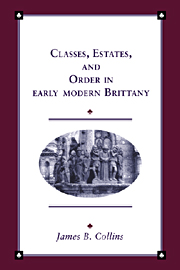Book contents
- Frontmatter
- Contents
- Preface
- List of abbreviations
- Glossary of French terms
- Introduction
- 1 The Breton economy in the sixteenth and seventeenth centuries
- 2 Elements of Breton society
- 3 Institutional structures of political control – financial and judicial organization
- 4 The Estates of Brittany and the Crown, 1532–1626
- 5 The Estates of Brittany and the Crown, 1626–1675
- 6 The burden of Breton taxation
- 7 The problem of order
- Conclusion
- Appendix
- Bibliography
- Index
- CAMBRIDGE STUDIES IN EARLY MODERN HISTORY
2 - Elements of Breton society
Published online by Cambridge University Press: 06 October 2009
- Frontmatter
- Contents
- Preface
- List of abbreviations
- Glossary of French terms
- Introduction
- 1 The Breton economy in the sixteenth and seventeenth centuries
- 2 Elements of Breton society
- 3 Institutional structures of political control – financial and judicial organization
- 4 The Estates of Brittany and the Crown, 1532–1626
- 5 The Estates of Brittany and the Crown, 1626–1675
- 6 The burden of Breton taxation
- 7 The problem of order
- Conclusion
- Appendix
- Bibliography
- Index
- CAMBRIDGE STUDIES IN EARLY MODERN HISTORY
Summary
THE INSTITUTIONAL FRAMEWORK OF SOCIAL CONTROL
The distribution of political power in early modern Brittany followed closely the distribution of economic resources. The province, like all French provinces of the Ancien Régime, had a superficial society of orders structure. This structure formed part of the system of political and moral authority; most importantly, it strongly influenced the perception of power and authority. The language of political discourse in seventeenth-century France was the language of tradition, of respect for custom and, by extension, of an ordered society. While contemporaries certainly thought in such a manner, they often acted according to different systems of societal organization. The Estates of Brittany invariably protected those privileges that had significant economic meaning to provincial elites.
In Brittany, as in Languedoc, the great power of the entire panoply of monarchical institutions – Sovereign Courts, Estates, town governments, seigneurial systems – meant that the limitations on the monarchy's actions retained their efficacity throughout the Ancien Régime. The contract between the Estates and the Crown provides the best symbol of those limitations. This contract placed the king's obligations to the province precisely in the sphere in which contemporaries felt he had the least freedom of action. Although Brittany had no specific constitution, a network of contracts provided Breton elites with guarantees, similar to those of a constitution, against arbitrary behavior.
The lower classes received, in these contracts, some protection from arbitrary royal behavior, but this protection came at the cost of a freer hand for local elites. When the lower classes received real benefits from the contracts, as in the case of defending Bretons from non-Breton jurisdictions, such as the gabelle courts, these benefits usually worked to the advantage of local elites as well.
- Type
- Chapter
- Information
- Classes, Estates and Order in Early-Modern Brittany , pp. 71 - 107Publisher: Cambridge University PressPrint publication year: 1994



